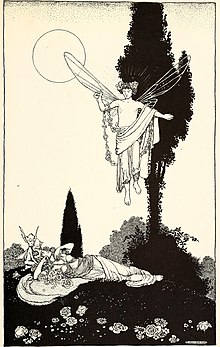A Midsummer Night's Dream
Appearance

Such shaping fantasies, that apprehend
More than cool reason ever comprehends.
A Midsummer Night's Dream, written in approximately 1595 or 1596, is a romantic comedy by William Shakespeare. The play is set in Athens, and consists of several subplots that revolve around the marriage of Theseus and Hippolyta. One subplot involves a conflict among four Athenian lovers. Another follows a group of six amateur actors rehearsing the play which they are to perform before the wedding. Both groups find themselves in a forest inhabited by fairies who manipulate the humans and are engaged in their own domestic intrigue.
Act I
[edit]- Four days will quickly steep themselves in nights;
Four nights will quickly dream away the time;
And then the moon, like to a silver bow
New bent in heaven, shall behold the night
Of our solemnities.- Hippolyta, scene i.
- But earthlier happy is the rose distill'd
Than that, which, withering on the virgin thorn,
Grows, lives, and dies, in single blessedness.- Theseus, scene i.
- For aught that ever I could read,
Could ever hear by tale or history,
The course of true love never did run smooth.- Lysander, scene i.
- O, hell! to choose love by another’s eye.
- Hermia, scene i.
- Swift as a shadow, short as any dream,
Brief as the lightning in the collied night,
That, in a spleen, unfolds both heaven and earth,
And ere a man hath power to say, — Behold!
The jaws of darkness do devour it up:
So quick bright things come to confusion.- Lysander, scene i.
- Love looks not with the eyes, but with the mind,
And therefore is winged Cupid painted blind.
Nor hath love’s mind of any judgement taste;
Wings and no eyes figure unheedy haste.
And therefore is love said to be a child
Because in choice he is so oft beguiled.- Helena, scene i.
- Masters, spread yourselves.
- Bottom, scene ii.
- This is Ercles’ vein.
- Bottom, scene ii.
- Nay, faith, let me not play a woman; I have a beard coming
- Flute, scene ii.
- I’ll speak in a monstrous little voice.
- Bottom, scene ii.
- I am slow of study.
- Snug, scene ii.
- That would hang us, every mother’s son.
- All, scene ii.
- I will roar you as gently as any sucking dove; I will roar you, an ’twere any nightingale.
- Bottom, scene ii.
- A proper man, as one shall see in a summer’s day.
- Quince, scene ii.
Act II
[edit]
And heard a mermaid, on a dolphin's back,
Uttering such dulcet and harmonious breath,
That the rude sea grew civil at her song...
- Over hill, over dale,
Thorough bush, thorough briar,
Over park, over pale,
Thorough flood, thorough fire,
I do wander everywhere,
Swifter than the moon's sphere;
And I serve the fairy queen,
To dew her orbs upon the green.
The cowslips tall her pensioners be;
In their gold coats, spots you see;
Those be rubies, fairy favours,
In their freckles live our savours.
I must go seek some dew-drops here,
And hang a pearl in every cowslip's ear.
Farewell, thou lob of spirits, I'll be gone;
My queen and all her elves come here anon!- Fairy, scene i.
- Ill met by moonlight, proud Titania.
- Oberon, scene i.
- The human mortals.
- Titania, scene i.
- Once I sat upon a promontory,
And heard a mermaid, on a dolphin's back,
Uttering such dulcet and harmonious breath,
That the rude sea grew civil at her song;
And certain stars shot madly from their spheres,
To hear the sea-maid’s music.- Oberon, scene i.
- And the imperial votaress passed on,
In maiden meditation, fancy-free.
Yet mark’d I where the bolt of Cupid fell:
It fell upon a little western flower,
Before, milk-white, now purple with love’s wound, —
And maidens call it love-in-idleness.- Oberon, scene i.
- I’ll put a girdle round about the earth
In forty minutes.- Puck, scene i.

Do it for thy true-love take
- My heart
Is true as steel.- Helena, scene i.
- I know a bank where the wild thyme blows,
Where ox-lips and the nodding violet grows;
Quite over-canopied with luscious woodbine,
With sweet musk-roses and with eglantine.- Oberon, scene i.
- What thou seest when thou dost wake,
Do it for thy true-love take,
Love and languish for his sake:
Be it ounce, or cat, or bear,
Pard, or boar with bristled hair,
In thy eye that shall appear
When thou wakest, it is thy dear:
Wake when some vile thing is near.- Oberon, scene ii.
Act III
[edit]
- A lion among ladies, is a most dreadful thing.
- Bottom, scene i.
- Flute: Must I speak now?
Quince: Ay, marry, must you: for you must understand he goes but to see a noise that he heard, and is to come again.- Scene i.
- O monstrous! O strange! we are haunted. Pray, masters! fly, masters! Help!
- Quince, scene i.
- Bless thee, Bottom! bless thee! thou art translated.
- Quince, scene i.
- I see their knavery: this is to make an ass of me; to fright me, if they could.
- Bottom, scene i.
- And yet, to say the truth, reason and love keep little company together nowadays.
- Bottom, scene i.
- Lord, what fools these mortals be!
- Puck, scene ii.
- And those things do best please me,
That do befall preposterously.- Puck, scene ii.
- So we grew together,
Like to a double cherry, seeming parted;
But yet a union in partition,
Two lovely berries moulded on one stem.- Helena, scene ii.
- I am amazed and know not what to say.
- Hermia, scene ii.

- Cupid is a knavish lad
Thus to make poor females mad.- Puck, scene ii.
- And though she be but little, she is fierce.
- Helena, scene ii, referring to her friend Hermia.
Act IV
[edit]
- I have an exposition of sleep come upon me.
- Bottom scene i.
- I have had a dream, past the wit of man to say what dream it was.
- Bottom, scene i.
- The eye of man hath not heard, the ear of man hath not seen, man’s hand is not able to taste, his tongue to conceive, nor his heart to report, what my dream was.
- Bottom, scene i.
- It seems to me that yet we sleep, we dream.
- Demetrius, scene i.
Act V
[edit]
Think but this, and all is mended,
That you have but slumber'd here
While these visions did appear,
And this weak and idle theme,
No more yielding, but a dream.
- Lovers and madmen have such seething brains,
Such shaping fantasies, that apprehend
More than cool reason ever comprehends.
The lunatic, the lover, and the poet,
Are of imagination all compact:
One sees more devils than vast hell can hold —
That is the madman;
The lover, all as frantic,
Sees Helen’s beauty in a brow of Egypt.
The poet’s eye, in a fine frenzy rolling,
Doth glance from heaven to earth, from earth to heaven;
And, as imagination bodies forth
The forms of things unknown, the poet’s pen
Turns them to shapes, and gives to airy nothing
A local habitation and a name.
Such tricks hath strong imagination,
That, if it would but apprehend some joy,
It comprehends some bringer of that joy;
Or, in the night, imagining some fear,
How easy is a bush suppos'd a bear.- Theseus, scene i.
- But all the story of the night told over,
And their minds transfigur'd so together,
More witnesseth than fancy's images,
And grows to something of great constancy,
But howsoever strange, and admirable.- Hippolyta, scene i.
- For never anything can be amiss,
When simpleness and duty tender it.- Theseus, scene i.
- The true beginning of our end.
- Quince, scene i.
- The best in this kind are but shadows; and the worst are no worse, if imagination amend them.
- Theseus, scene i.
- A very gentle beast, and of a good conscience.
- Theseus, scene i.
- I am a-weary of this moon; would he would change!
- Hippolyta, scene i.
- Theseus: This passion, and the death of a dear friend, would go near to make a man look sad.
Hippolyta: Beshrew my heart, but I pity the man.- Scene i.
- The iron tongue of midnight hath told twelve.
- Theseus, scene i.
- If we shadows have offended,
Think but this, and all is mended,
That you have but slumber'd here
While these visions did appear.
And this weak and idle theme,
No more yielding, but a dream,
Gentles, do not reprehend;
If you pardon, we will mend.
And, as I am an honest Puck,
If we have unearned luck,
Now to 'scape the serpent's tongue,
We will make amends ere long:
Else the Puck a liar call.
So good night unto you all.
Give me your hands, if we be friends,
And Robin shall restore amends.- Puck, scene i.


